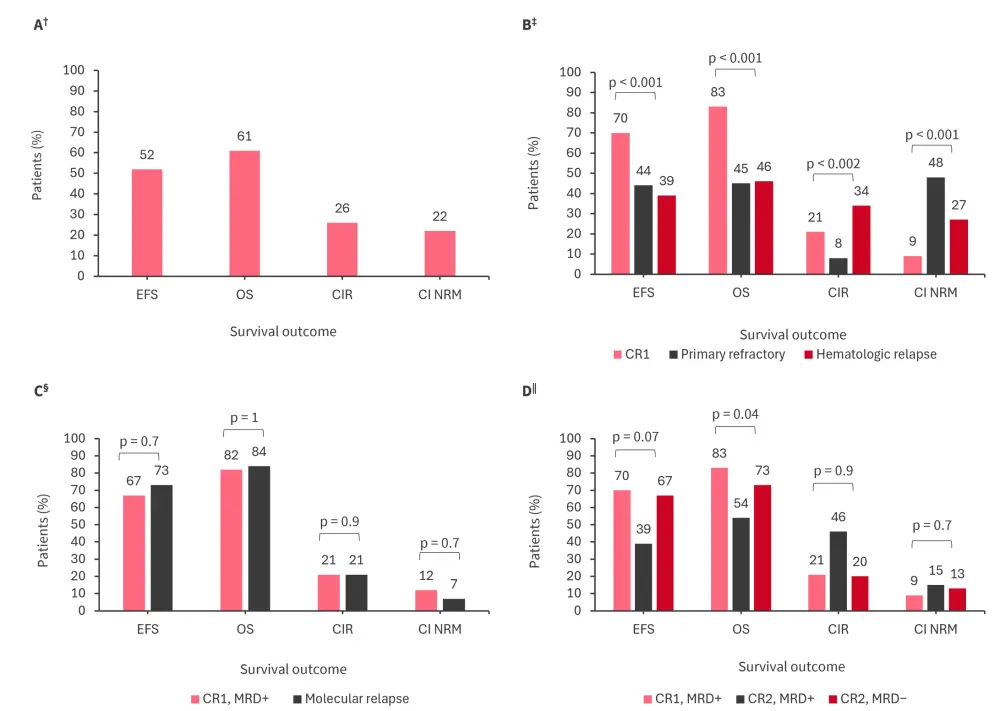All content on this site is intended for healthcare professionals only. By acknowledging this message and accessing the information on this website you are confirming that you are a Healthcare Professional. If you are a patient or carer, please visit Know AML.
The aml Hub website uses a third-party service provided by Google that dynamically translates web content. Translations are machine generated, so may not be an exact or complete translation, and the aml Hub cannot guarantee the accuracy of translated content. The aml and its employees will not be liable for any direct, indirect, or consequential damages (even if foreseeable) resulting from use of the Google Translate feature. For further support with Google Translate, visit Google Translate Help.
The AML Hub is an independent medical education platform, sponsored by Daiichi Sankyo, Johnson & Johnson, Syndax, Thermo Fisher Scientific, Kura Oncology, AbbVie, and has been supported through an educational grant from the Hippocrate Conference Institute, an association of the Servier Group.
Funders are allowed no direct influence on our content. The levels of sponsorship listed are reflective of the amount of funding given. View funders.
Now you can support HCPs in making informed decisions for their patients
Your contribution helps us continuously deliver expertly curated content to HCPs worldwide. You will also have the opportunity to make a content suggestion for consideration and receive updates on the impact contributions are making to our content.
Find out more
Create an account and access these new features:
Bookmark content to read later
Select your specific areas of interest
View AML content recommended for you
Impact of disease stage and MRD treatment on outcomes in patients with NPM1-mutated AML proceeding to allo-HSCT
NPM1 mutations in patients with acute myeloid leukemia (AML) indicate a favorable prognosis without allogeneic hematopoietic stem cell transplantation (allo-HSCT).1 Equally, patients with NPM1-mutated AML and positive measurable residual disease (MRD) often experience superior outcomes with allo-HSCT compared with chemotherapy.1 While MRD positivity prior to allo-HSCT is an adverse predictor of survival, the impact of disease stage at the time of transplant and of treatment for molecular positivity on patient outcomes remains unclear.1
During the 50th Annual Meeting of the European Society for Blood and Marrow Transplantation, Bug presented results from a study investigating outcomes of patients with NPM1-mutated AML in relation to their disease stage at the time of allo-HSCT. We summarize the presentation below.
Study design1
-
A retrospective multicenter study
-
Patient survival outcomes at the following disease stages were compared:
-
-
Positive MRD in first complete remission (CR1) vs hematologic relapse
-
Persistent MRD vs relapsed MRD
-
Treated vs untreated molecular relapse
-
-
Study endpoints were event-free survival, overall survival, cumulative incidence of relapse, and cumulative incidence of non-relapse mortality.
Key findings1
-
A total of 227 patients were enrolled in the trial
-
-
Persistent MRD at CR1 (n = 46)
-
Relapsed MRD at CR1 (n = 45)
-
Primary refractory disease (n = 24)
-
Hematologic relapse (n = 112)
-
-
Survival outcomes for each patient subgroup are shown in Figure 1.
Figure 1. Survival outcomes for A all patients after 4 years, B hematologic/molecular remission status, C persistent MRD vs relapsed MRD, and D positive MRD at CR1 vs CR2*

CI NRM, cumulative incidence of non-relapse mortality; CIR, cumulative incidence of relapse; CR1, first complete remission; CR2, second complete remission; EFS, event-free survival; MRD, measurable residual disease; OS, overall survival.
*Adapted from Bug.1
†n = 227
‡n = 227
§n = 91
‖n = 118
- Multivariable analysis showed the following factors to be associated with inferior overall survival:
-
-
Untreated hematologic relapse (hazard ratio [HR] 3.91; p = 0.009)
-
Refractory relapse (HR 5.55; p < 0.001)
-
Primary refractory disease (HR 3.76; p = 0.016)
-
Unrelated human leukocyte antigen-mismatched donor (HR 2.13; p = 0.044)
-
|
Key learnings |
|
References
Please indicate your level of agreement with the following statements:
The content was clear and easy to understand
The content addressed the learning objectives
The content was relevant to my practice
I will change my clinical practice as a result of this content

